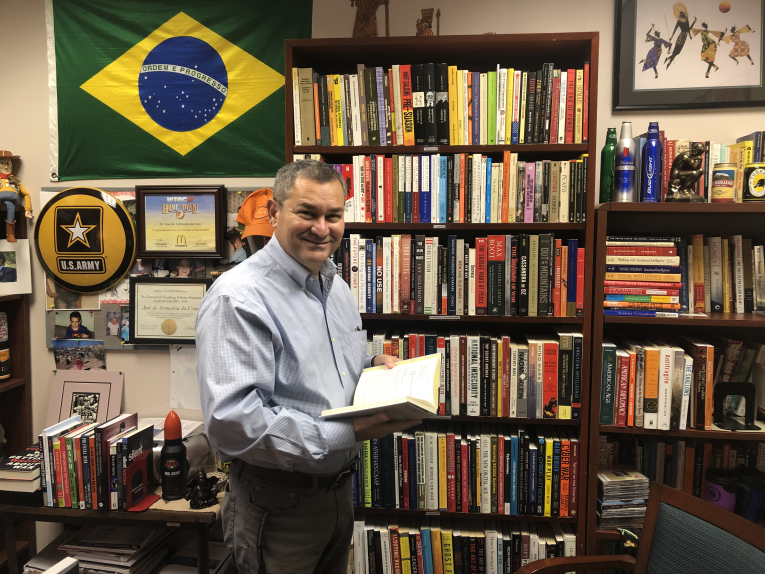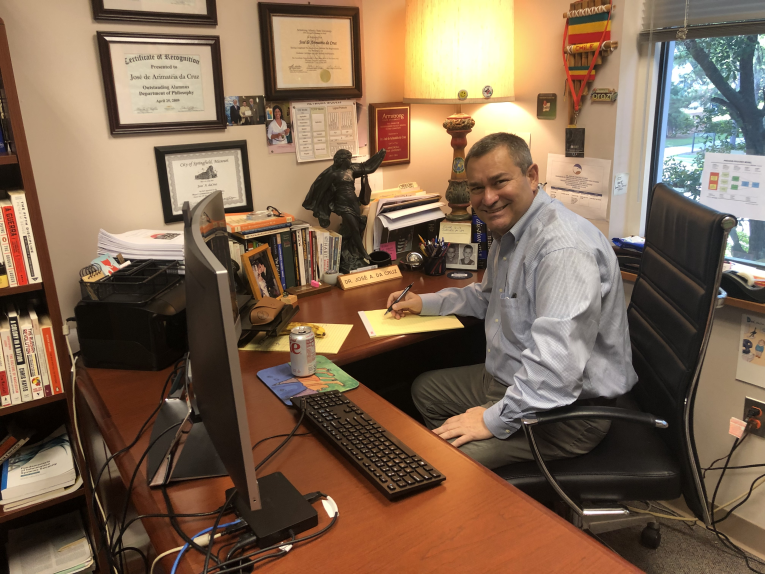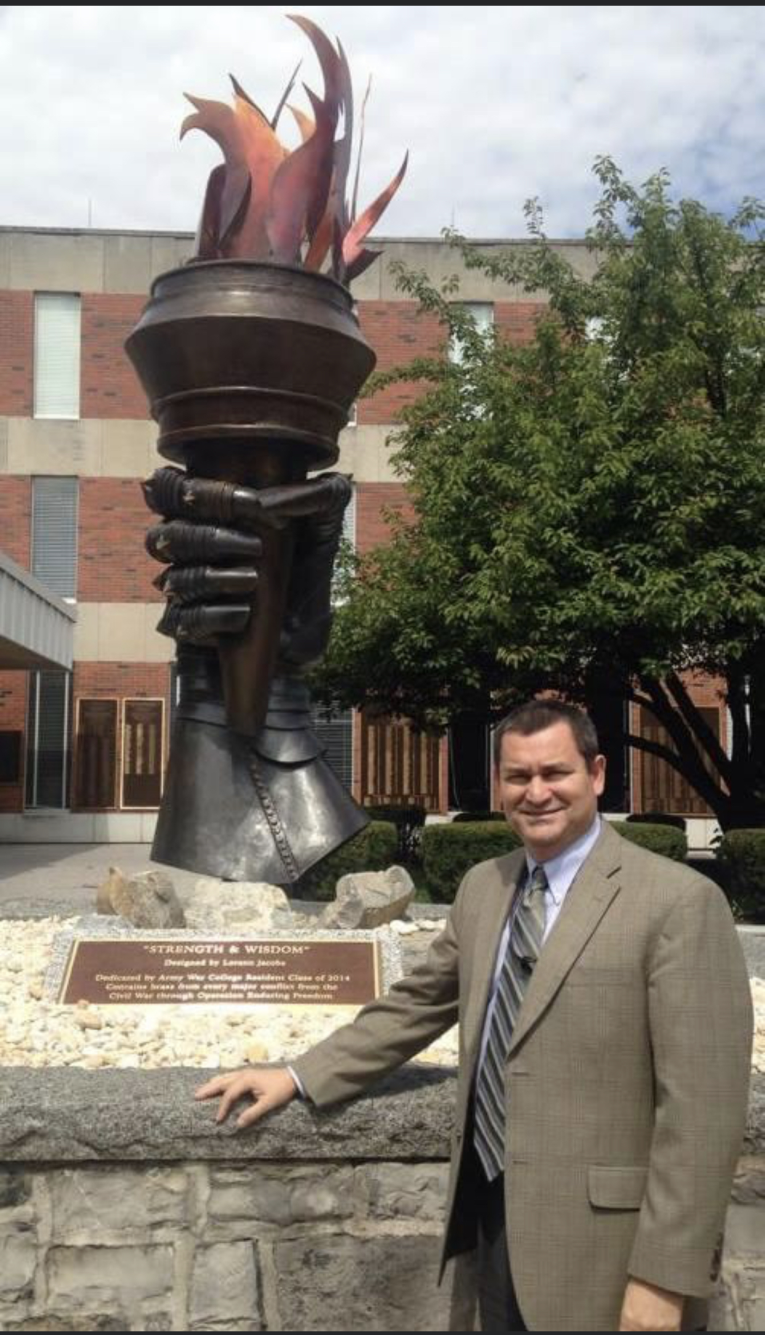Talent is everywhere but requires an opportunity to be revealed
Jose de Aramateia da Cruz, Professor of Political Science and International Studies, Georgia Southern University – Savannah, Georgia

From shining shoes as a young boy on the shores of Brazil’s famed Copacabana Beach to becoming a Professor of political science and international studies at Georgia Southern University in Savannah, Georgia, Jose’s life story is certainly inspiring. Starting with a chance meeting and a willingness to seize the opportunity, it changed his life’s trajectory.
“I grew up in a little city called Sapé located in the Brazilian northeast, and then later my family moved to Rio de Janeiro,” Jose shares. “I am one of nine siblings, five girls and four boys, and including my parents, that’s a family of 11. Both of my parents are uneducated. I think they maybe have the equivalent of a sixth-grade education, so they can barely read or write their names.”
However, despite his parents’ minimal education and the family living in one of the poorest and dangerous shantytowns in Brazil, Jose emphasizes how education was always viewed as important in his family.
“We grew up in a shantytown called Nova Holanda, which back in the ‘70s and ‘80s was probably one of the worst shantytowns in Brazil to live in,” he recalls. And although many of his friends at the time were involved with drugs and gangs, da Cruz made a conscious effort to do the right thing which to him was focusing on his education. “Even though I was friends with and I would talk to these individuals, I always tried to make sure that I was doing the right thing which for me was getting up and going to school.”
Conveniently for Jose, the school was located about a block from his house, and also provided students with a free meal. This was a great incentive for him to attend school as he was guaranteed a meal at lunch, which meant that his family “could save a little bit more” food for the evening. In order to help supplement his father’s minimum wage salary and provide more money for the family, Jose and his brothers took jobs shining shoes.
“After school, my brothers and I would go to Copacabana so we could earn a little bit of money by shining shoes,” he states. “And then one day a man by the name of Edwin Shrimpton, who was a General Electric executive and labor union guy from Ohio, came to have his shoes shined and we started talking. He asked me a few questions such as what my name was, my age, and if I was in school. I told him my name and that I was 12 years old and in either the first or second grade- which I was way too old for, but it wasn’t because I was dumb or didn’t care about education, but more because my priority was to earn money to help my family.”

“A few weeks later I get a package addressed to me from Chagrin Falls Ohio, and thought to myself ‘what is this? I don’t know anybody from there.’ Turns out that was where Mr. Shrimpton was from and the package was from him,” he says laughing. “There were a bunch of school supplies along with a letter directing me to meet a lady named Odete Amaral, his GE counterpart based in Rio.”
Upon meeting Amaral, Jose was informed that Mr. Shrimpton wanted him to go to school and would pay him $25 a month. “After I did the calculations I realized that it was almost the equivalent of two minimal wages!” da Cruz exclaims in recalling his surprise. “And I said, ‘yes I’ll take it, I’ll go to school’ not quite understanding how this would change the course of my life.”
With Shrimpton’s support and guidance from Amaral, da Cruz enrolled in school, and after completing eighth grade, he moved on to a prestigious high school where the children of diplomats, lawyers, and doctors went, and despite the school administration’s reservations on “enrolling a kid from the shantytown,” Jose excelled and became a model student. Later he and Shrimpton agreed that he should continue his education in the US.
Fast forward to the present day and Jose has a bachelor’s degree, four master’s degrees, and a Ph.D. In addition to being a professor, he is also the president of the Savannah Council on World Affairs, participates in a number of other organizations, and holds many other roles and Board seats within Savannah.
“I’m a strong believer that whatever community you’re a part of you should want to do everything you can to leave it better than when you got there,” he emphasizes. “So since I got to Savannah twenty years ago, I’ve been trying to find my place within this community and figure out how I can make it better for everyone who lives here,” he adds with a smile.
“A day at work for me starts at 8:00am when I get to the office and I’m there until about 4:00pm,” the tenured professor informs. “In addition to my teaching obligations, I am also an advisor to certain majors within my discipline and I am also involved in research publications, I sit on the tenure promotion committee, grievance committee, honors committee, and so I am quite busy attending meetings regularly.”
In his advisory role at the University, Jose explains that he serves as a mentor and helps students decide what they want to do with their degrees, “what their ambitions, goals, and plans are, as well as where they want to be in terms of short term and long term.”

In discussing how educational institutions and the process of education is changing, da Cruz says, “We’re becoming more and more regulated, and there is a lot more demand placed on us. We are dealing with an increase in students who have mental health and other issues, we have first-generation students, who have never had a role model in their life and rely on us to guide them. We also are beginning to see more non-traditional students coming back to get an education after being away for more than 20 or 30 years.”
As far as the effect that the COVID-19 pandemic has had on education, Jose highlights that “the pandemic was not just a health crisis, but it was also an economic and social crisis,” which affected education and students’ ability to learn.
“Many of the students who live in rural areas near Savannah come from low-income families and are able to go to school because of loans or scholarships and a large number of them did not have access to computers or the Internet,” da Cruz states. “I’m not going to punish those students for not turning in their paper because they did not have connectivity in their homes or access to it nearby. This was a major challenge we faced during remote learning, and we must come together with our politicians and lawmakers to address this issue, and how we handle a crisis like this in the future,” he says in a concerned tone.
When asked what work means to him, Jose confidently says, “To be happy in what you are doing and feel a sense of appreciation. I was telling my wife the other day that I still enjoy going to class. On the first day of class I still get excited and nervous. I can’t wait to see the students. It’s like going to kindergarten, and I’ve been doing this for 27 years now, so I’m not a spring chick,” he adds with a smile.
Still recognising the opportunity that changed his life, Jose shares the biggest lesson he has learned from his own story. “Opportunity doesn’t always come twice and when it comes you have to grab it and give 110% of yourself!” He exclaims. “I always tell this to my son and daughter as well as my students. When that door opens you enter and you do the best that you can, even if the outcome is not what you expect.”
“Everything that I am today, all the opportunities that I have had, the family, the jobs, the circle of friends are all because of that one moment in 1978, when I was asked ‘would you like to go to school’ and I said yes, I do. That is when and how I won the lottery,” Jose recalls with pride.